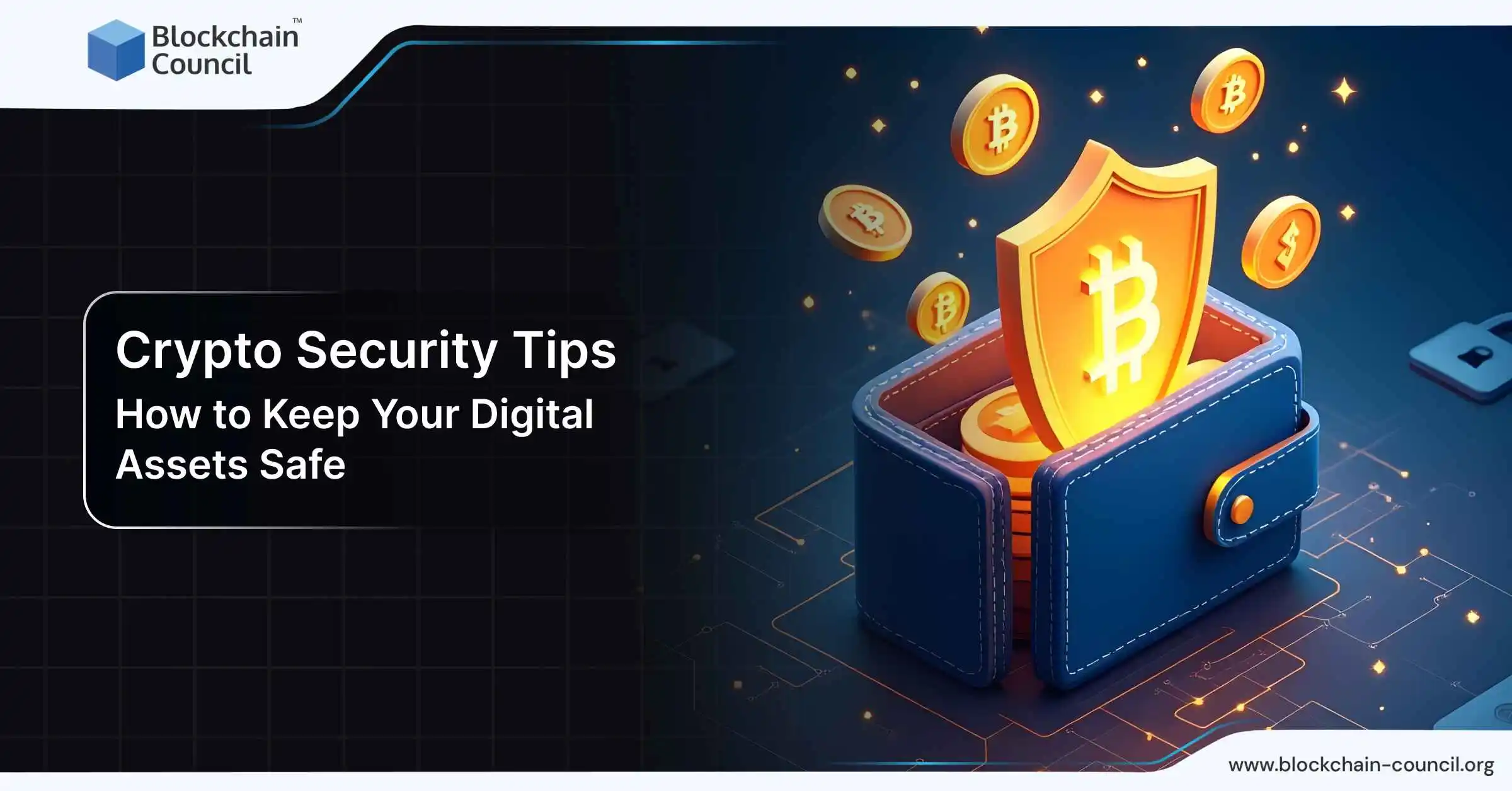
- Blockchain Council
- February 17, 2025
Introduction
Cryptocurrency has become a global phenomenon, revolutionizing the way we conduct financial transactions, invest, and store value. With the rise of digital currencies like Bitcoin, Ethereum, and a growing number of altcoins, individuals and institutions alike are rushing to embrace this innovative financial technology. However, with the many benefits of cryptocurrencies come significant risks—most notably, the security of digital assets.
As the popularity of cryptocurrencies continues to grow, so too do the threats targeting crypto holders. From phishing scams to hacking attempts, and even the theft of private keys, the importance of securing your digital assets cannot be overstated. This article aims to provide actionable security tips that can help both beginners and experienced cryptocurrency users keep their assets safe from theft, loss, or fraud.
If you’re serious about protecting your crypto investments, consider gaining professional knowledge through certifications such as the Certified Cryptocurrency Expert™ (CCE), Certified Blockchain Expert™ (CBE), and the Online Degree™ in Cryptocurrency & Trading. These programs not only enhance your understanding of the blockchain and cryptocurrency world but also help you make informed decisions when it comes to securing your assets. Additionally, certifications like Certified Node.JS Developer™, Certified React Developer™ (offered by Global Tech Council), and Certified SEO Expert® or Certified Instagram Growth Expert from Universal Business Council can further strengthen your technical skills and expand your career in the blockchain and tech sectors.
Understanding Cryptocurrency Security Risks
Before diving into the best practices for securing your digital assets, it’s important to understand the risks involved. The nature of blockchain technology itself offers a degree of security, but the surrounding environment—including exchanges, wallets, and personal handling of private keys—can introduce vulnerabilities.
Here are some of the most common risks that cryptocurrency holders face:
- Phishing Scams: Fraudulent attempts to obtain your sensitive information by pretending to be a trustworthy entity, often through email or social media.
- Hacking: Cybercriminals attempt to infiltrate exchanges, wallets, and other platforms to steal digital assets.
- Private Key Theft: If someone gains access to your private key, they can access your wallet and transfer your assets without your consent.
- Exchange Vulnerabilities: While many exchanges have strong security, breaches are still possible, as seen in major hacks over the past few years.
- Malware: Harmful software designed to infiltrate your system and steal information such as private keys.
Crypto Security Tips: Protecting Your Assets
Now that we have an understanding of the risks, here are the top strategies to keep your digital assets secure.
a) Use Strong, Unique Passwords
Passwords are the first line of defense against unauthorized access. When setting up accounts on cryptocurrency exchanges or wallets, ensure that you use strong, unique passwords. Avoid using common phrases or easily guessable information.
Tips for creating strong passwords:
- Use a combination of uppercase and lowercase letters, numbers, and special characters.
- Avoid using personal information like your name or birthday.
- Consider using a password manager to store and generate complex passwords.
b) Enable Two-Factor Authentication (2FA)
Two-factor authentication adds an additional layer of security by requiring a second form of verification, usually through a mobile app or SMS code. Always enable 2FA for your exchange accounts, wallet apps, and email accounts tied to your cryptocurrency investments.
Recommended 2FA apps:
- Google Authenticator
- Authy
- Microsoft Authenticator
c) Store Cryptocurrency in Secure Wallets
When it comes to storing your cryptocurrency, wallets are essential. However, not all wallets are created equal. There are two main types of wallets: hot wallets and cold wallets.
- Hot wallets are connected to the internet and are more convenient for regular transactions but are more susceptible to hacking.
- Cold wallets are offline, making them far more secure from online threats.
Best practices for wallet security:
- Use cold wallets (e.g., hardware wallets like Ledger or Trezor) for long-term storage.
- Only use hot wallets for small, day-to-day transactions.
- Regularly back up your wallet’s private keys and recovery phrases in secure locations, like encrypted USB drives.
d) Be Wary of Phishing Attacks
Phishing attacks can be devastating, as attackers use fraudulent websites or emails to trick you into revealing your login details. Always double-check the URL of websites you visit, especially when accessing your wallet or cryptocurrency exchanges.
Tips for avoiding phishing:
- Never click on links from unsolicited emails or messages.
- Always verify the authenticity of the sender by checking the domain name.
- If you’re unsure, type the website address manually into the browser.
e) Regularly Update Software and Wallets
Keeping your software up to date is essential for security. Many updates include important patches that fix vulnerabilities. Whether it’s your wallet software or the cryptocurrency exchange app, always ensure you’re using the latest version.
Best practices:
- Turn on automatic updates for all relevant software.
- Regularly update your antivirus software to protect against malware.
- If you’re using a cold storage solution, ensure the firmware is up to date.
f) Use a VPN for Extra Privacy
Using a VPN (Virtual Private Network) adds an additional layer of security, especially when accessing your crypto accounts from public or unsecured networks. A VPN encrypts your internet traffic, making it difficult for hackers to intercept your data.
Recommended VPN providers:
- NordVPN
- ExpressVPN
- CyberGhost
g) Secure Your Backup Keys and Seed Phrases
Backup keys and seed phrases are essential for recovering your crypto wallet in case of loss or damage. Store them in multiple secure locations, and never share them with anyone, even if they seem trustworthy.
Best practices for backup storage:
- Write them down on paper and store them in a safe place.
- Consider using a safety deposit box for long-term storage.
- Use encrypted USB drives for digital storage.
h) Monitor Your Accounts Regularly
Regular monitoring of your cryptocurrency accounts can help detect suspicious activity early. Set up notifications on your exchanges and wallets to alert you to any login attempts or transactions.
Tips for monitoring:
- Enable transaction alerts for any withdrawals or transfers from your wallets.
- Regularly check the addresses you have sent assets to and verify them.
- Look out for unauthorized changes to your account settings or withdrawal methods.
Conclusion: Keep Your Digital Assets Safe
As cryptocurrency adoption continues to rise, it’s essential to prioritize the security of your digital assets. By following the tips outlined in this article—using strong passwords, enabling two-factor authentication, and utilizing cold storage wallets—you can significantly reduce the risks associated with cryptocurrency ownership.
Additionally, gaining specialized knowledge through certifications such as Certified Cryptocurrency Expert™ (CCE), Certified Blockchain Expert™ (CBE), and the Online Degree™ in Cryptocurrency & Trading from Blockchain Council can give you the tools to make informed decisions on securing your digital assets and thriving in the crypto space.
Global Tech Council certifications, like Certified Node.JS Developer™ and Certified React Developer™, as well as Universal Business Council certifications such as Certified SEO Expert® and Certified Instagram Growth Expert, can further enhance your expertise in the blockchain and technology domains, positioning you as a trusted professional in the industry.
Stay vigilant and proactive about your crypto security to ensure your digital assets remain safe from potential threats.





































































 Guides
Guides News
News Blockchain
Blockchain Cryptocurrency
& Digital Assets
Cryptocurrency
& Digital Assets Web3
Web3 Metaverse & NFTs
Metaverse & NFTs
